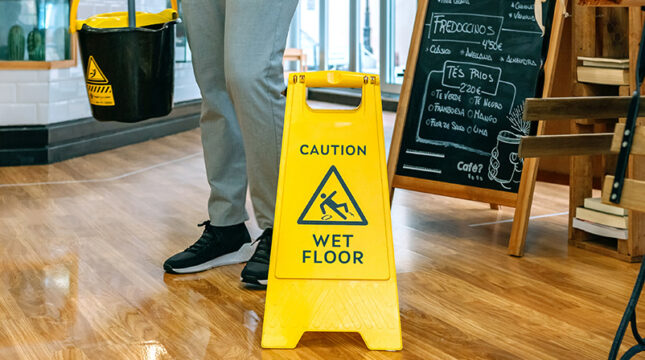Jump ahead to learn more about:
What is business renters insurance?
If you rent a brick-and-mortar storefront, warehouse or office space for your business, the property owner will usually have their own insurance for the space.
Renters are often required to take out business renters insurance, also called commercial renters insurance, as part of their lease. The most common types of coverage include:
This additional layer of security can help protect the property and/or the contents of the business (inventory and infrastructure) and help defray the costs of injury.
What can commercial renters insurance cover?
Landlords may require this coverage for business renters for a few reasons:
- Protection of renter assets and property. Your landlord may own the floors, ceiling and walls, but they don’t own what you and your business house in the space, such as display cases, products and inventory or your company’s computer equipment. They want your business to stay in business. Business personal property coverage (included with commercial property insurance) can help replace or repair these items after a covered event, such as a fire or water damage.
- A shield from loss of income after a catastrophic event. Your business income could plunge in the event of a business-stopping event like fire, water damage or theft. If your landlord wants you to keep paying rent, it’s to their benefit for you to have some protection on your income. Business income insurance can help.
- Assistance paying for accident or injury expenses. If someone gets hurt in your store or offices, your landlord will want you to bear some financial responsibility for legal fees, repairs or medical costs. General liability insurance can help with these costs.
- Coverage for damage to the building. If your employee is hanging a shelving unit and — uh, oh — there’s now a gaping hole in the wall; your landlord will want you to be prepared to cover the cost of repairs to the building. This repair could also be covered by commercial property insurance.
What kind of business renters insurance is required by landlords?
These are some of the most common commercial lease insurance policies your landlord may require:
General liability insurance for injury and property damage
General liability is usually the first type of insurance business owners purchase. It helps protect against third-party injuries and property damage.
Let’s say you own an auto repair shop and a client trips, falls and injures their shoulder. They might sue you for the cost of their medical expenses, such as surgery and physical therapy.
Your insurance company can help cover the claim, your business continues to operate as usual, and you can continue to pay the rent.
Without insurance, instead of filing a claim, you have to scrape together the cash or fork over your savings to pay the customer’s medical expenses. Without insurance’s safety net, you could fall behind on bills, and your business longevity could be at risk.
Commercial property insurance for business property repair
Commercial property insurance helps pay to repair or replace business property if it’s damaged or stolen. Mariah Jeffrey, a real estate agent for Coldwell Banker Property Exchange, requires all her tenants to maintain this type of coverage. Here’s why.
A tenant in one of her buildings runs a casino. A disgruntled customer once flushed a glass down the toilet, damaging the casino and the health department next door.
The casino and the health department needed new flooring. Since Jeffrey’s tenant had commercial property insurance, the insurer covered the cost of repairing the flooring in both locations.
Business owner’s policy (BOP) for the best of general liability and commercial property insurance
If your landlord requires both general liability and commercial property coverage, you can consider a business owner’s policy (BOP), which combines the two types of insurance. You get the coverage benefits of both policies — including injuries and property damage, medical payments and lawsuits — often at a better price.
Business interruption insurance for loss of income coverage
Remember that casino we talked about above with a plumbing problem caused by a disgruntled customer?
If the casino had to close for repairs and couldn’t make money during that time, Jeffrey has a plan for that, too. She (and many other landlords) also require tenants to maintain business interruption insurance.
“If they have to shut down because their property flooded, insurance could cover their income for that period of time,” Jeffrey said. Tenants can still cover their rent and the rest of their bills.
Note: NEXT includes business interruption coverage in our commercial property insurance.
What happens if you don’t have business renters insurance?
If you don’t carry business renters insurance, it’s unlikely that you’ll be able to rent a commercial space for your office, business storefront or commercial warehouse.
Know that commercial renters insurance is a good idea and the cost of doing business. Without it, you leave yourself and your business vulnerable to accidents, injuries, damage, theft and more that could cost you tremendously out of pocket — and also potentially shutter your business.
What does your landlord’s insurance cover (and not cover)?
“A lease can be structured in any way the landlord and tenant agree to,” said Jeffrey.
Some leases, known as triple net (NNN) leases, pass all expenses for the property to the tenant, including taxes, insurance and maintenance. Others split the costs between the landlord and the tenant.
Jeffrey once had a property, where in addition to insuring the whole building, she was responsible for insuring a restroom and a hallway utility closet in the common area.
Her tenants were responsible for carrying a policy to cover their own negligence. So, if someone slips and falls on the wet restroom floor, Jeffrey is liable. But if a customer is injured in a tenant’s space, the tenant would be liable.
Jeffrey has another building where she is responsible for insuring the roof and the HVAC system. The tenant is responsible for insuring the rest of the property. When a hailstorm damaged the building, Jeffrey and the tenant filed two separate claims.
Jeffrey’s insurance covered the damage to the roof and the building’s two HVAC systems. The tenant’s commercial lease insurance covered the broken windows plus the carpet and business property damaged by the leaking roof.
The insurance companies paid out close to $150,000 on the combined claims.
If you ever doubt what expenses you’re responsible for versus your landlord, check your lease and consult with your business insurance carrier.
What does adding your landlord as an “additional insured” mean?
For some landlords, seeing your certificate of insurance may not be enough. They may want you to add them to your policy as an additional insured.
Adding an additional insured does not change your coverage. It just means your landlord has protection for damage and liabilities you may bring to their property.
Jeffrey requires her tenants to list her as an additional insured.
“We don’t want to get into a situation where [the tenant’s] property is damaged and they decide [they] just want to pocket this money and move somewhere else,” she said. “We need to ensure that we’re protected and get reimbursed for any damage.”
How NEXT helps protect small commercial business renters
Getting commercial lease insurance to meet your landlord’s requirements is fast, easy and affordable at NEXT.
With our online application, you can apply for coverage, see your options, get a quote and purchase coverage in less than 10 minutes
You just need to answer a few questions about your business. As soon as you make a payment, you’ll get access to your certificate of insurance so you can send landlords a copy and/or list them as an additional insured.
If you have questions, our licensed, U.S.-based insurance professionals are standing by to help.
Get started with your free quote today.






